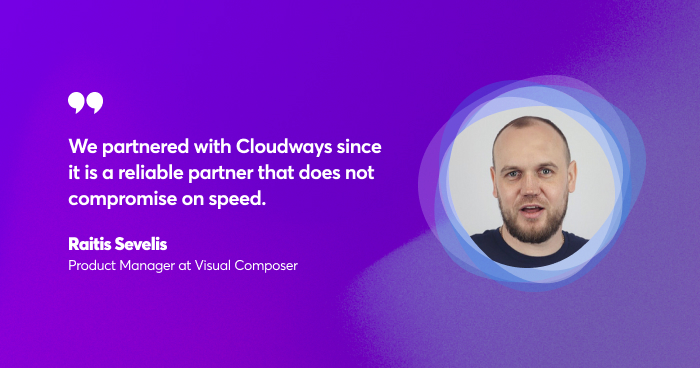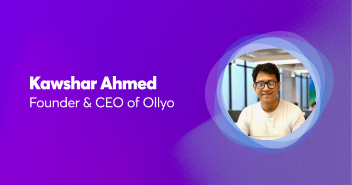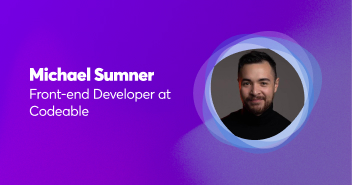
Raitis Sevelis has 10+ years of experience as a product manager, and in ecommerce and UI/UX. He currently works as a product manager at Visual Composer and WPBakery – the leading commercial content management platforms for WordPress with over 4.5 million active customers. Through his work at Visual Composer and as a thinker and contributor in his personal capacity, Raitis is at the forefront of making WordPress more accessible – and easier to use – for millions of people around the world.
Today Raitis shares his opinions on the WordPress community, Visual Composer partnership with Cloudways, and more.
Farhan: You have been active in the open-source and WordPress community for nearly all your working life. What attracted you to open-source and WordPress?
Raitis: To be honest, I did not know much about WordPress before joining the WPBakery team almost 10 years ago. Back then, WordPress was just another CMS for blogging. I liked what WPBakery was doing to uncover the potential of WordPress for non-techies.
The first thing that attracted me was the number of plugins and themes available (even it was significantly lower than today). You could quickly put WordPress on “steroids” with plugins like WPBakery and Yoast SEO. Everyone could use WordPress and everyone could develop for it.
My path to the WordPress community was rather slow. During my first years at WPBakery, we did not go into the community a lot. It was all about sitting in the office and working on the product we loved. After a few years, we started to attend local meetups, and realized that people recognized us (that was a huge and pleasant surprise).
I think we became a lot more active in the WordPress community once we started to work on Visual Composer Website Builder. At this point, we can give back for everything that the community has done for us during our early years.
Farhan: What, in your opinion, makes the WordPress community one of the largest and most vibrant communities in the world? What makes the WordPress community such a welcoming place for everyone – from experienced developers and technologists to absolute newcomers?
Raitis: It is easy to become a part of the WordPress community – all you have to do is join.
WordPress is relatively easy for everyone and there is plenty of space to express yourself. We have theme authors, plugin authors, developers, bloggers, SEO specialists, business people, and marketing gurus. We even have communities within the community. With such a wide range of options, everyone can find a group where he/she belongs.
Also, it is important to mention the leadership of WordPress. These guys put the community as a cornerstone. It looks like that this long-term strategy has paid off well.
Farhan: What do you see as the challenges and opportunities for WordPress in the years to come?
Raitis: This is a tough one. I think several factors will impact the future of WordPress.
The first one is the learning curve. Despite constant UX improvements, WordPress is still harder to learn if we compare it with other web platforms. At the same time, I am excited to see that things are getting addressed on different levels to resolve it.
The second factor is a monopoly. With recent acquisitions, it looks like WordPress is slowly being overtaken by several major players. This leaves less room for newcomers who want to build their business around WordPress. On the other hand, new opportunities come up and create their niche markets. When WPBakery released an API, we managed to create a separate market for add-ons. The same thing has happened with Gutenberg blocks and will probably extend to the patterns.
Farhan: The last two years have seen, well, an explosion in the number of mergers and acquisitions in the open-source space and WordPress in particular. What are your thoughts on this current trend? What is driving this – and what is the likely endpoint?
Raitis: Acquisitions are a natural evolution and there is no way we can avoid that in WordPress. It all comes down to who acquires whom and what happens next.
In the community-driven market (and I believe WordPress is the one), people are more suspicious about acquisitions. As a user, you are familiar with the product and the company behind it. Maybe you have backed them up during the early stages or know the author in person. After acquisitions, it is natural to have fears about the product’s future. Are they going to continue development? Are they going to change the price? Maybe the product will become just a part of their portfolio.
Farhan: Why do you think Visual Composer has become so popular over the years? What’s the key to your success?
Raitis: Here we will need to separate two products first. WPBakery – the first generation page builder. And Visual Composer Website Builder, the next generation builder.
WPBakery was among the first ones to offer an easy way to build pages in WordPress. Once I joined the company, it has a simple backend editor in comparison to shortcode mess. We managed to introduce an API to allow other authors to develop solutions for the page builder and integrate them into their themes. The first of a kind frontend editor was introduced to WordPress via WPBakery to lower the barrier for non-technical people. All these initiatives were revolutionary (if we can say so) to WordPress and people jumped on the bandwagon.
Today, Visual Composer Website Builder is the new product that is often confused with WPBakery. Nevertheless, it has its own path and solutions. We were the first ones to introduce ReactJS to get rid of the shortcodes even before WordPress started to talk about it. The cloud library is another great solution to allow users to keep their sites clean and get content elements, templates, and add-ons on-demand. And I can not skip performance – this was (and still is) one of the key factors we pay attention to while developing Visual Composer.
Visual Composer is still growing in the process of grabbing users’ hearts, but we see a positive trend there and have tons of ideas.
Farhan: What are your thoughts and opinions on the never-ending debate about the future of page-builders and website-builders in the Gutenberg era? How will a user’s experience change over the years and how is Visual Composer positioning itself to take advantage of that trend?
Raitis: This question has been on the table from day one once we heard about Gutenberg.
Gutenberg is an obvious move for WordPress if we look into content management and compare it with other solutions.
At the same time, none of the page builders are standing still. There is constant development happening and we see page builders receiving more attention than ever.
Of course, individual paths differ. Some are going after UI/UX, others want to become independent platforms, and so on.
We see Visual Composer as a solution that goes beyond content creation. Your websites’ lifecycle does not end once you publish your site, so does the work you perform there. We want to support users during the whole lifecycle by giving them smart suggestions on how to improve their site and win over competitors. One of the things that differentiate us from others is Visual Composer Insights – a real-time analysis tool that helps you tailor your content for accessibility, SEO, performance, and design.
Farhan: A few years back, you and Visual Composer started the WPGivesAHand charity movement. Tell us more about the movement, its impact, and its future.
Raitis: It all started a few years back when our CEO, Michael Makijenko, proposed an in-house charity program during the holidays season. Everyone from the company was able to donate any amount and the company would double it.
Since we love doing charity on our own, we were excited about the idea.
After two years, we started to think about how to scale it. The idea about WPGivesAHand came up and we decided to give it a try.
We knew that lots of companies are doing seasonal sales during the low season. So, why not simply give that portion of cash to the charity?! We approached several of our partners and they welcomed the idea.
WPGivesAHand was quickly accepted by the WordPress community. The fact that everyone can participate and help someone in need by purchasing the products you will need anyway is amazing.
It has been our second year with WPGivesAHand and we are surely not going to stop. This year we’ve managed to double the number of participants. Plus, we see larger players, like Cloudways, joining the movement. We believe that, as a community, we can do a lot more in the years to come.
Farhan: Now, changing gears, Visual Composer was one of the first companies to partner with Cloudways to create a complete 1-click solution. How does it help the potential user? What is the value to the user?
Raitis: We all want to make WordPress available to everyone. We also see how easier it is to start with the alternatives. Building a site in Squarespace or Wix is just a few clicks away. Our dream was to introduce the same option for Visual Composer and WordPress.
With the 1-click solution, we are doing just that. You don’t have to be a skilled web developer or know anything about hosting management. Visual Composer and Cloudways will take care of you – simple as that.
Why Cloudways? There are many hosting companies out there … As I said before, we take performance and quality questions very seriously. This is why we wanted to have a reliable partner that does not compromise when it comes to speed. Cloudways are surely one of the best out there which makes the partnership between Visual Composer and Cloudways an obvious choice.
Disclaimer: I use Cloudways myself for my community projects and can say that I don’t have to think about hosting at all.
Farhan: What do you see as the future of the Cloudways and Visual Composer joint solution? How are you going to further develop the partnership and solution?
Raitis: We have started our partnership with the free version of Visual Composer to make it accessible. Now, we are looking to expand our offering with the premium version to satisfy the growing needs of professional web developers.
In addition, we see a great opportunity for solutions tailored for specific niches to lower the barrier for new businesses going online.
Generally speaking, we have plenty of ideas on the table, but I don’t want to uncover all the cards (laughing).
Farhan: Thank you so much for taking the time to speak to us. Any parting thoughts for all the readers, web creators, designers, and developers?
Raitis: I would like to thank our partners at Cloudways for being there with us and their willingness to build a better web together.
To all the community members out there, I know that the last couple of years have been tough for many of us. From lockdowns to losing beloved ones. I just want to remind everyone that we are a large community that cares about each other. Do not hesitate to reach out for help and look for people who may need your help. Together we can build a lot more than just another WordPress site.
Sajjad Shahid
Sajjad is an Ecommerce Community Manager at Cloudways. He loves helping out Ecommerce store owners, merchants and marketers in establishing their businesses and startups. Sajjad enjoys playing table tennis and cricket over the weekend.

